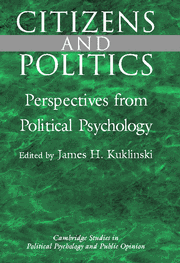Book contents
- Frontmatter
- Contents
- List of Contributors
- Prologue: Political Psychology and the Study of Citizens and Politics
- PART I AFFECT AND EMOTIONS
- Introduction
- 1 The Role of Affect in Symbolic Politics
- 2 Emotions and Politics: The Dynamic Functions of Emotionality
- 3 Cognitive Neuroscience, Emotion, and Leadership
- 4 Emotion as Virtue and Vice
- PART II POLITICAL COGNITION
- PART III POLITICAL ATTITUDES AND PERCEPTIONS
- PART IV POLITICAL VALUES
- Index
- Titles in the series
Introduction
Published online by Cambridge University Press: 07 October 2011
- Frontmatter
- Contents
- List of Contributors
- Prologue: Political Psychology and the Study of Citizens and Politics
- PART I AFFECT AND EMOTIONS
- Introduction
- 1 The Role of Affect in Symbolic Politics
- 2 Emotions and Politics: The Dynamic Functions of Emotionality
- 3 Cognitive Neuroscience, Emotion, and Leadership
- 4 Emotion as Virtue and Vice
- PART II POLITICAL COGNITION
- PART III POLITICAL ATTITUDES AND PERCEPTIONS
- PART IV POLITICAL VALUES
- Index
- Titles in the series
Summary
Although scholars continue to distinguish affect from cognition, they recognize that the two interact in complex ways to influence political attitudes and judgments. Most of the authors in this and the following part explicitly acknowledge this reality, and some propose models that explicitly take affect and cognition as intertwined. The six chapters nonetheless fall into two groups, those that emphasize affect and emotions (Sears, Marcus and MacKuen, and Masters) and those that emphasize cognition (Lau and Redlawsk, McGraw, and Taber, Lodge, and Glathar). What ties them together is their adoption in one form or another of an information processing perspective.
CONCEPTIONS
Social psychologists distinguish affect from emotion. “Affect,” according to this categorization, is a generic term encompassing not only emotions, but also mood and evaluations. “Emotions” include a whole range of specific feelings, from fear, anger, and sadness to happiness and enthusiasm. For some needs, this distinction has value. For purposes of evaluating the following chapters, the distinction is less helpful, and thus the two terms will be used interchangeably. On the other hand, affect and emotion should not be, and are not, equated with mood in the chapters that follow. Whereas emotions are caused by reactions to specific targets, moods are general feelings not directed at anyone or anything. This is not to say that mood is irrelevant to political evaluations, as Clore and Isbell note in their commentary.
- Type
- Chapter
- Information
- Citizens and PoliticsPerspectives from Political Psychology, pp. 7 - 13Publisher: Cambridge University PressPrint publication year: 2001
- 1
- Cited by

